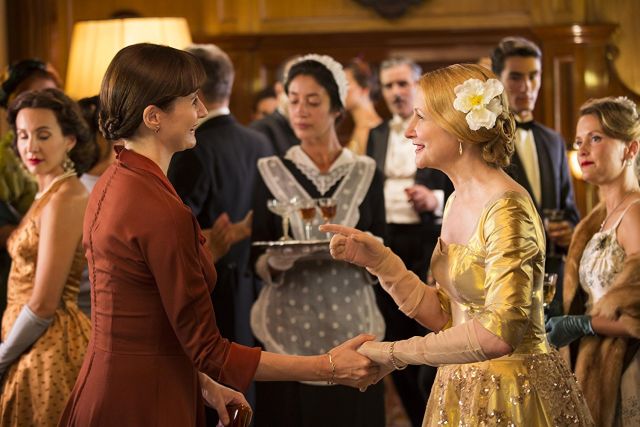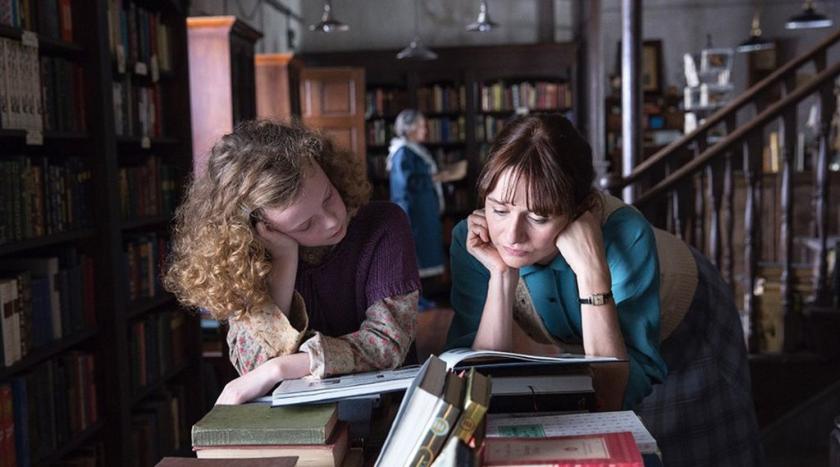"All this fuss over a bookstore?!" That's likely to be a common reaction to Spanish director Isabel Coixet's The Bookshop, which adapts a slender if much-admired 1978 novel by the quintessentially English Penelope Fitzgerald in order to cock a Continental snook at her English compatriots' mean-spirited ways. Following hard on the lamentable Book Club, here's another film that appears not to know what to do with the landscape of the printed word. Poetic justice would have sent both straight to the DVD pile.
A drawn-faced Emily Mortimer plays Florence Green, a gentle-seeming war widow who wants nothing more than to open an indie bookstore in a coastal Suffolk town ca 1957, only to have the neighbours react as if Peter Grimes had suddenly moved in next door. The community powers-that-be intend to make Florence's rundown locale of choice into an arts centre, which would on the face of it seem a far noisier, less palatable option than a quiet, bookish environment (though logic isn't much in evidence). Resistance is led by a pursed-lipped Patricia Clarkson, in full English-accented mode, who isn't above tapping parliamentary connections, if you please, to have her maleficent way.  Poor Florence can't get a break. Scarcely has she taken a precocious local girl Christine (Honor Kneafsey) under her wing to help in the shop before the child's mum is raising an objection-heavy roof. And though our heroine finds an ally of sorts in the reclusive, solicitous Brundish (Bill Nighy, pictured above) whom she acquaints with Ray Bradbury's Fahrenheit 451, this lone voice of reason doesn't linger on sufficiently to be much use to Florence's apparently beleaguered cause. (Nor is Brundish much of a friend to literature-as-physical-entity, announcing early on a preference for ripping the covers off books so as not to be reminded that they were written by real people.)
Poor Florence can't get a break. Scarcely has she taken a precocious local girl Christine (Honor Kneafsey) under her wing to help in the shop before the child's mum is raising an objection-heavy roof. And though our heroine finds an ally of sorts in the reclusive, solicitous Brundish (Bill Nighy, pictured above) whom she acquaints with Ray Bradbury's Fahrenheit 451, this lone voice of reason doesn't linger on sufficiently to be much use to Florence's apparently beleaguered cause. (Nor is Brundish much of a friend to literature-as-physical-entity, announcing early on a preference for ripping the covers off books so as not to be reminded that they were written by real people.)
 The deck, it soon becomes clear, is so stacked against Florence (and for no authentic reason) that exasperation quickly sets in, notwithstanding the pictorial allure of Jean-Claude Larrieu's camerawork, which sells provincial England as somewhere worth looking at if nowhere you might actually want to live; Julie Christie's narrative voice-over, meanwhile, makes a case for recording Fitzgerald's novel on tape. The material as it exists onscreen hardly stretches the performers, who register in other ways. Nighy's face is becoming more than ever a thing of wonder, much as Michael Gambon's did before him, and one assumes a friendship between Mortimer and an ill-used Clarkson dating back to (and beyond) the latter's West End appearance a few seasons ago alongside Mortimer's husband, Alessandro Nivola, in The Elephant Man. (Mortimer and Clarkson pictured above)
The deck, it soon becomes clear, is so stacked against Florence (and for no authentic reason) that exasperation quickly sets in, notwithstanding the pictorial allure of Jean-Claude Larrieu's camerawork, which sells provincial England as somewhere worth looking at if nowhere you might actually want to live; Julie Christie's narrative voice-over, meanwhile, makes a case for recording Fitzgerald's novel on tape. The material as it exists onscreen hardly stretches the performers, who register in other ways. Nighy's face is becoming more than ever a thing of wonder, much as Michael Gambon's did before him, and one assumes a friendship between Mortimer and an ill-used Clarkson dating back to (and beyond) the latter's West End appearance a few seasons ago alongside Mortimer's husband, Alessandro Nivola, in The Elephant Man. (Mortimer and Clarkson pictured above)
Mortimer, too, lends her customary intelligence to a part requiring Florence to confront a collectively oppressive establishment whereby the sale of Lolita constitutes the last straw: presumably, and by extension, the local theatrical fare of choice might not run much further than Getting Gertie's Garter. Before long, I began wondering why Florence didn't take advantage of the various boats at the ready and simply hop a passage to France. I'm sure Paris's iconic Shakespeare and Company would snap her up and allow her to bid Little England goodbye.















Add comment